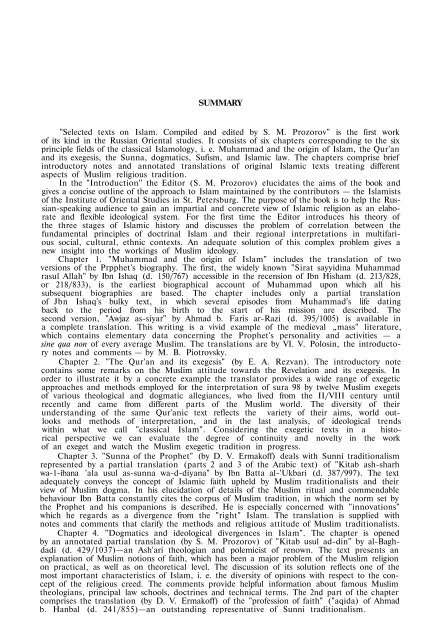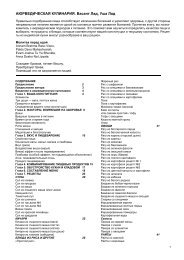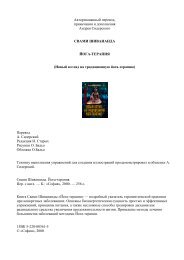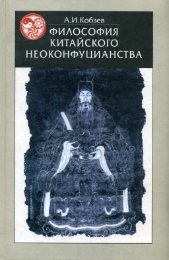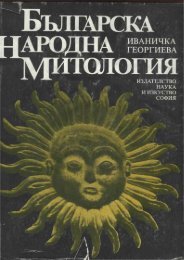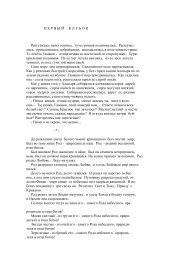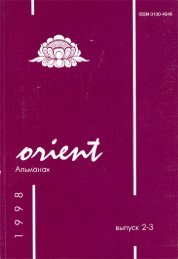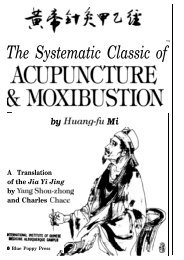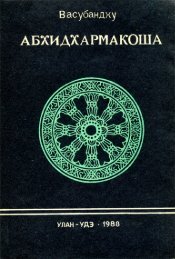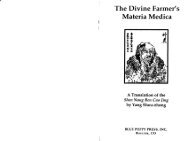SUMMARY"Selected texts on Islam. Compiled and edited by S. M. Prozorov" is the first workof its kind in the Russian Oriental studies. It consists of six chapters corresponding to the sixprinciple fields of the classical Islamology, i. e. Muhammad and the origin of Islam, the Qur'anand its exegesis, the Sunna, dogmatics, Sufism, and Islamic law. The chapters comprise briefintroductory notes and annotated translations of original Islamic texts treating differentaspects of Muslim religious tradition.In the "Introduction'' the Editor (S. M. Prozorov) elucidates the aims of the book andgives a concise outline of the approach to Islam maintained by the contributors — the Islamistsof the Institute of Oriental Studies in St. Petersburg. The purpose of the book is to help the Russian-speakingaudience to gain an impartial and concrete view of Islamic religion as an elaborateand flexible ideological system. For the first time the Editor introduces his theory ofthe three stages of Islamic history and discusses the problem of correlation between thefundamental principles of doctrinal Islam and their regional interpretations in multifarioussocial, cultural, ethnic contexts. An adequate solution of this complex problem gives anew insight into the workings of Muslim ideology.Chapter 1. "Muhammad and the origin of Islam" includes the translation of twoversions of the Prpphet's biography. The first, the widely known "Sirat sayyidina Muhammadrasul Allah" by Ibn Ishaq (d. 150/767) accessible in the recension of Ibn Hisham (d. 213/828,or 218/833), is the earliest biographical account of Muhammad upon which all hissubsequent biographies are based. The chapter includes only a partial translationof Jbn Ishaq's bulky text, in which several episodes from Muhammad's life datingback to the period from his birth to the start of his mission are described. Thesecond version, "Awjaz as-siyar" by Ahmad b. Faris ar-Razi (d. 395/1005) is available ina complete translation. This writing is a vivid example of the medieval „mass" literature,which contains elementary data concerning the Prophet's personality and activities — asine qua поп of every average Muslim. The translations are by VI. V. Polosin, the introductorynotes and comments — by M. B. Piotrovsky.Chapter 2. "The Qur'an and its exegesis" (by E. A. Rezvan). The introductory notecontains some remarks on the Muslim attitude towards the Revelation and its exegesis. Inorder to illustrate it by a concrete example the translator provides a wide range of exegeticapproaches and methods employed for the interpretation of sura 98 by twelve Muslim exegetsof various theological and dogmatic allegiances, who lived from the II/VIII century untilrecently and came from different parts of the Muslim world. The diversity of thei<strong>ru</strong>nderstanding of the same Qur'anic text reflects the variety of their aims, world outlooksand methods of interpretation, and in the last analysis, of ideological trendswithin what we call "classical Islam". Considering the exegetic texts in a historicalperspective we can evaluate the degree of continuity and novelty in the workof an exeget and watch the Muslim exegetic tradition in progress.Chapter 3. "Sunna of the Prophet" (by D. V. Ermakoff) deals with Sunni traditionalismrepresented by a partial translation (parts 2 and 3 of the Arabic text) of "Kitab ash-sharhwa-1-ibana 'ala usul as-sunna wa-d-diyana" by Ibn Batta al-'Ukbari (d. 387/997). The textadequately conveys the concept of Islamic faith upheld by Muslim traditionalists and theirview of Muslim dogma. In his elucidation of details of the Muslim ritual and commendablebehaviour Ibn Batta constantly cites the corpus of Muslim tradition, in which the norm set bythe Prophet and his companions is described. He is especially concerned with "innovations"which he regards as a divergence from the "right" Islam. The translation is supplied withnotes and comments that clarify the methods and religious attitude of Muslim traditionalists.Chapter 4. "Dogmatics and ideological divergences in Islam". The chapter is openedby an annotated partial translation (by S. M. Prozorov) of "Kitab usul ad-din" by al-Baghdadi(d. 429/1037)—an Ash'ari theologian and polemicist of renown. The text presents anexplanation of Muslim notions of faith, which has been a major problem of the Muslim religionon practical, as well as on theoretical level. The discussion of its solution reflects one of themost important characteristics of Islam, i. e. the diversity of opinions with respect to the conceptof the religious creed. The comments provide helpful information about famous Muslimtheologians, principal law schools, doctrines and technical terms. The 2nd part of the chaptercomprises the translation (by D. V. Ermakoff) of the "profession of faith" ("aqida) of Ahmadb. Hanbal (d. 241/855)—an outstanding representative of Sunni traditionalism.
234 ПриложенияChapter 5. "Sufism". It consists of a partial annotated translation (by A. D. Knysh) of"Kitab al-luma" fi-t-tasawwuf"— the earliest extant Sufi manual by the Muslim scholar AbuNasr as-Sarraj at-Tusi (d. 378/988). The translator has chosen the part of the text that dealswith so called "stations" (maqamat) and "states" (ahwal) of the Sufi path leading to Godand the higher mysteries of human "self". The doctrine of "stations" and "states", whichstill has not lost its importance for the Muslim mystics, is considered to be the corner-stoneof Sufism and may serve as an apt introduction to its fundamentals. The notes and commentscontain essential information on early Sufism and its representatives.Chapter 6. "Islamic law". The chapter contains some data pertaining to the historyof Islamic jurisp<strong>ru</strong>dence (al-fiqh), which is represented by a partial translation of"Kitab al-kharaj" by Abu Yusuf Ya'qub (d. 182/798)—an eminent jurist and the first chiefqadi (qadi-1-qudat) of the Islamic state. In his book Abu Yusuf discusses such importantissues of Islamic law as taxation, legal foundations of the functioning of the state, land tenure,etc. The translation of the text by the late A. E. Schmidt (archive materials of the Institute•of Oriental Studies in St. Petersburg) treats some fundamental principles of Islamic criminallaw, legal prosecution, and procedure. It also includes a vivid and detailed description of severalepisodes from everyday life of the people in the new-born Caliphal state, which may beof interest to a wider audience. The introduction and notes to the translation are supplied byA. S. Bogolyubov.The book is illustrated by a number of photographic representations of pages from theArabic manuscripts which have their origins in different countries of the Muslim world anddate back to different periods in the Islamic history. They will give the reader an idea of thevarieties of the Arabic script, and may also serve as an aid for training students to read Arabichandwritten texts.The book is supplied with the glossary and a number of indices: proper <strong>nam</strong>es, <strong>nam</strong>es oftheological schools and teachings, book titles, geographical <strong>nam</strong>es.The book's intended audience is undergraduate students (Orientalists), Islamists,specialists on the humanities (students of religion, philosophers, historians, culturologistsetc.), as well as all those interested in the history of Islam and its ideology.Translated by A. Knysh
- Page 3:
ББК 86.38Х91Составите
- Page 7 and 8:
6 Введениечены фраг
- Page 9 and 10:
8 Введениезнание то
- Page 11:
10 Раздел 1хо знаем п
- Page 16 and 17:
Ибн Хишам 15и потому
- Page 18 and 19:
Ибн Хишам 17решит за
- Page 20 and 21:
Ибн Хишам 19Сказал И
- Page 22 and 23:
Ибн Хишам 21«Ведь да
- Page 24 and 25:
Ибн Хишам 23и призыв
- Page 26 and 27:
Ибн Хишам 258У жител
- Page 28 and 29:
Ахмад б. Фарис 27Алл
- Page 30 and 31:
Ахмад б. Фарис 29за а
- Page 32 and 33:
Ахмад б. Фарис 31б. А
- Page 34 and 35:
Ахмад б. Фарис 33нам
- Page 36 and 37:
Коран и его толкова
- Page 38 and 39:
Коран и его толкова
- Page 41 and 42:
40 Раздел 2(см.: ал-Дж
- Page 43:
Рис. 2
- Page 46 and 47:
Мукатил б. Сулайман
- Page 48 and 49:
ал-Бухари 47Ал-Бухар
- Page 50 and 51:
ал-Бухари 0приобрет
- Page 52 and 53:
ат-Табари 51В эпоху
- Page 54 and 55:
ат-Табари 53[также]:
- Page 56 and 57:
аз-Замахшари 55Аз-За
- Page 59 and 60:
58 Раздел 2не дарует
- Page 61 and 62:
fiO Раздел 2Ат-Табарс
- Page 63 and 64:
62 Раздел 2Значение.
- Page 65 and 66:
64 Раздел 2УБОЯЛСЯ Г
- Page 67 and 68:
66 Раздел 2474 • II Сур
- Page 69 and 70:
68 Раздел 2по мусуль
- Page 71 and 72:
70 Раздел 2не рай выс
- Page 73:
Рис. 4б
- Page 76 and 77:
ал-Махалли и ас-Суй
- Page 79 and 80:
78 Раздел 2НО ПРЕБУД
- Page 81 and 82:
80 Раздел 2ШИМИ — от
- Page 83 and 84:
82 Раздел 2да, где те
- Page 85 and 86:
84 Раздел 2ные», т. е.
- Page 87 and 88:
Раздел 3ХАДИСЫ, СУН
- Page 89:
Рис. 6б
- Page 92 and 93:
Ибн Батта ал-'Укбар
- Page 94 and 95:
Ибн Батта ал-'Укбар
- Page 96 and 97:
Ибн Батта ал-'Укбар
- Page 98 and 99:
Ибн Батта ал-'Укбар
- Page 100 and 101:
Ибн Батта ал-'Укбар
- Page 102 and 103:
Ибн Батта ал-'Укбар
- Page 104 and 105:
Ибн Батта ал-*Укбар
- Page 106 and 107:
Ибн Батта ал-'Укбар
- Page 108 and 109:
Ибн Батта ал-'Укбар
- Page 110 and 111:
Догматика 109одним и
- Page 113 and 114:
112 Раздел 4'Абд ал-Ка
- Page 115 and 116:
114 Раздел 4гелов и в
- Page 117 and 118:
116 Раздел 4да благос
- Page 119 and 120:
118 Раздел 4мы упомян
- Page 121 and 122:
120 Раздел 4тот срок
- Page 123 and 124:
122 Раздел 4будет пре
- Page 125 and 126:
124 Раздел 4велик он
- Page 127 and 128:
126 Раздел 4ческую си
- Page 129 and 130:
128 Раздел 4тов. Сужд
- Page 131 and 132:
130 Раздел 4Абу 'Абда
- Page 133 and 134:
132 Раздел 4жа') о дей
- Page 135 and 136:
134 Раздел 4ал-Бухари
- Page 137 and 138:
136 Раздел 4Ахмад б. Х
- Page 139 and 140:
138 Раздел 4ступка (з
- Page 141 and 142:
Рис. 8
- Page 143 and 144:
142 Раздел 5ловек блю
- Page 145 and 146:
144 Раздел 546 о несом
- Page 147 and 148:
146 Раздел 549 сказыва
- Page 149 and 150:
148 Раздел 5нии не уп
- Page 151 and 152:
150 Раздел 5О втором
- Page 153 and 154:
152 Раздел 5б. 'Али сп
- Page 155 and 156:
154 Раздел 5„Они над
- Page 157 and 158:
156 Раздел 5у множест
- Page 159 and 160:
158 Раздел 5небытие,
- Page 161 and 162:
160 Раздел 5нечном сч
- Page 163 and 164:
162 Раздел 510Абу 'Абд
- Page 165 and 166:
164 Раздел 5Massignon. Passio
- Page 167 and 168:
166 Раздел 571Смысл эт
- Page 169 and 170:
168 Раздел 6неарабов,
- Page 171 and 172:
170 Раздел 6Абу Йусуф
- Page 173 and 174:
172 Раздел 6судьи], то
- Page 175 and 176:
174 Раздел бналожени
- Page 177 and 178:
176 Раздел 6со слов Х
- Page 179 and 180:
178 Раздел бполагает
- Page 181 and 182:
180 Раздел 6ленно убь
- Page 183 and 184: 182 Раздел 6кто нанял
- Page 185 and 186: 184 Раздел 6любодеян
- Page 187 and 188: 186 Раздел 6Рассказы
- Page 189 and 190: 188 Раздел 6нице — бо
- Page 191 and 192: 190 Раздел 6Если кто-
- Page 193 and 194: 192 Раздел 6фай' 51 , ни
- Page 195 and 196: 194 Раздел 6Тому, кто
- Page 197 and 198: 196 Раздел 6руку, так
- Page 199 and 200: 198 Раздел 6в связь с
- Page 201 and 202: 200 Раздел 6или посто
- Page 203 and 204: 202 Раздел 6ды и на бл
- Page 206 and 207: ГЛОССАРИЙ'абид (мн.
- Page 208 and 209: Глоссарий 207мурид (
- Page 210 and 211: СПИСОК СОКРАЩЕНИЙМ
- Page 212 and 213: Список использован
- Page 214 and 215: Список использован
- Page 216 and 217: УКАЗАТЕЛЬ ПОСЛЕДОВ
- Page 218 and 219: УКАЗАТЕЛЬ ИМЕНАбан
- Page 220 and 221: Указатель имен 219Ай
- Page 222 and 223: Указатель имен 221аз
- Page 224 and 225: Указатель имен 223ал
- Page 226 and 227: Указатель имен 225'У
- Page 228 and 229: УКАЗАТЕЛЬ НАЗВАНИЙ
- Page 230 and 231: УКАЗАТЕЛЬ ТОПОНИМО
- Page 232: SUMMARY
- Page 237 and 238: ContentsOn the Station of Trust in
- Page 239 and 240: Глава о состоянии н
- Page 241: ДЛЯ ЗАМЕТОК


